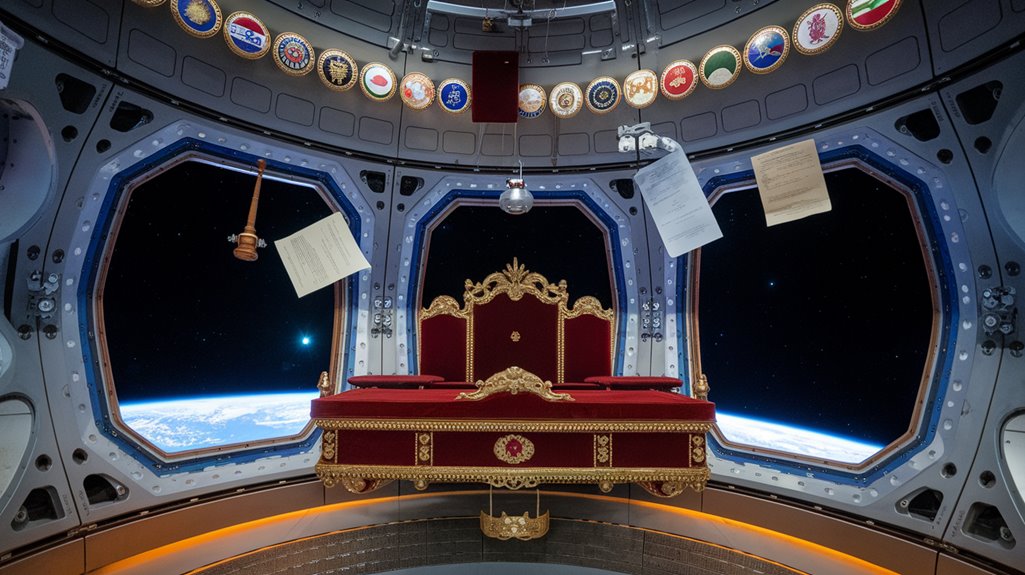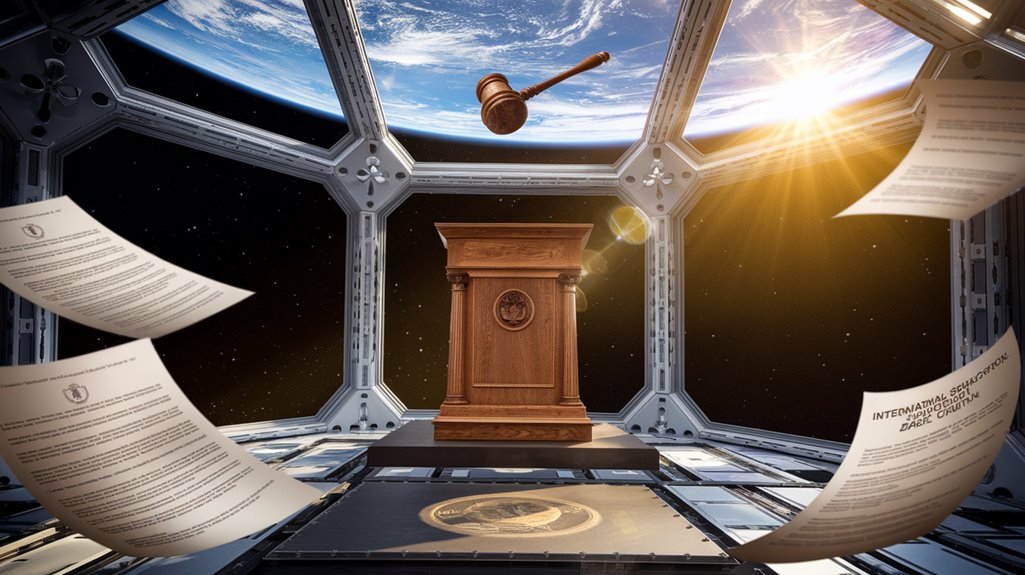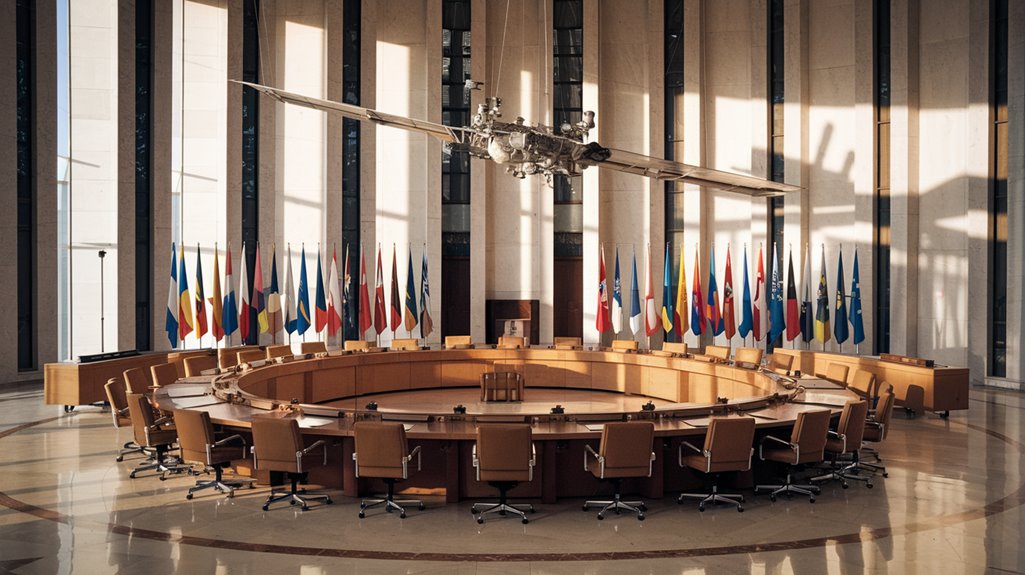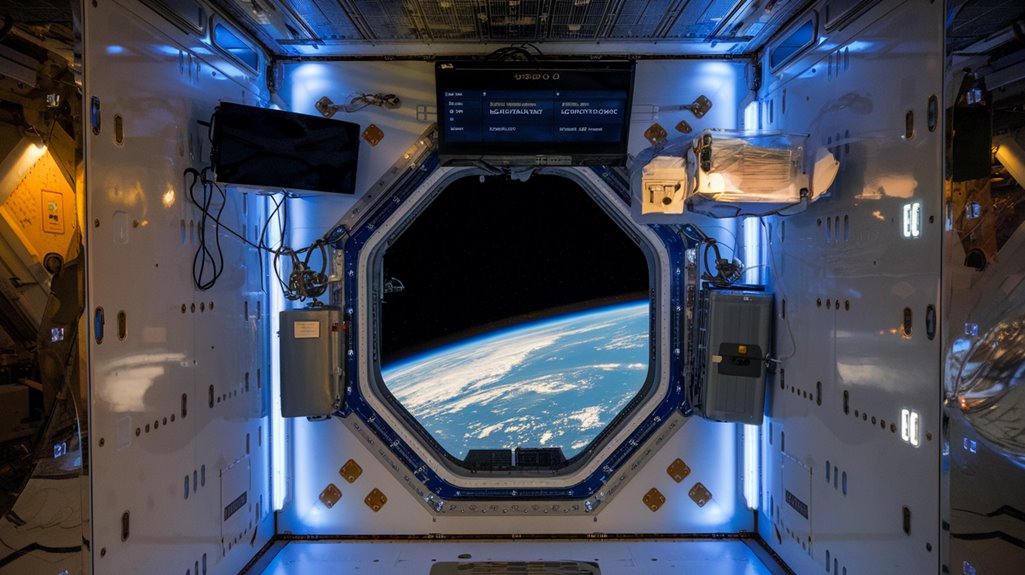Criminal Laws in Orbit: The Space Jurisdiction Puzzle
You've probably never thought about committing a crime in space, but the legal framework up there isn't as clear-cut as you'd think. When you're floating 250 miles above Earth's surface, traditional jurisdictional boundaries blur, and everyday criminal laws face unique challenges. As space tourism expands and orbital habitats become reality, the question of who's in charge when things go wrong becomes increasingly significant. The answer isn't simple, and that's precisely what makes this legal frontier so intriguing.
The Traditional Boundaries of Criminal Law vs. Space Reality

While traditional criminal law firmly anchors itself to geographic territories on Earth, the reality of space exploration and commercialization challenges these fundamental principles.
Like the role of an academical expounder's map, space law must outline clear shapes and connections for establishing criminal jurisdiction in this new frontier.
You'll find that space's unique status as res communis directly conflicts with American criminal law's territoriality maxim, forcing a criminal law evolution that extends beyond conventional boundaries.
As you explore extraterritorial jurisdiction in space, you'll notice how traditional sovereignty-based rules become increasingly inadequate.
Earth's legal frameworks rely on clear geographic borders, but space lacks these physical boundaries.
The Outer Space Treaty's prohibition of national appropriation further complicates matters, making it impossible to apply standard jurisdictional principles.
This disconnect between terrestrial legal traditions and space reality demands innovative solutions for addressing criminal behavior beyond Earth's atmosphere.
Current Legal Framework for Space Station Crime
Since astronauts began living aboard the International Space Station (ISS), the Space Station Intergovernmental Agreement (IGA) has served as the primary legal framework for handling criminal matters in orbit.
Under this agreement, you'll find that each participating nation maintains criminal jurisdiction over its own citizens, regardless of which module they're in during an incident.
While space treaties lay the groundwork for international cooperation, jurisdictional challenges persist.
If you're involved in a crime that affects multiple nationalities aboard the ISS, you'll face a complex web of overlapping legal authorities.
The agreement emphasizes nationality over physical location, meaning your country's laws follow you into space.
This system, though not perfect, provides a practical solution for maintaining order in humanity's only permanent orbital outpost.
If a crime occurs on a specific module, Article VIII of the Outer Space Treaty may also grant jurisdiction to that module's registered nation.
With the rise of space tourism, these jurisdictional frameworks will need to evolve to address new categories of space travelers.
Multiple Nations, One Crime: Managing Jurisdiction Conflicts
When criminal activities in space involve multiple nationalities, resolving jurisdictional conflicts becomes a delicate diplomatic challenge.
You'll find that traditional principles of extraterritorial jurisdiction often fall short in space, where no nation holds sovereignty and the concept of res communis prevails.
The existing Outer Space Treaty 1967 complicates matters by creating ambiguity in determining which nation's laws should apply.
In cases where your nation's citizens are involved in incidents aboard the International Space Station, you'll need to navigate complex agreements between participating countries.
If a crime affects multiple nations' modules or personnel, countries must consult each other to determine prosecution rights.
International cooperation through frameworks like the Combined Space Operations Initiative helps manage these jurisdictional overlaps.
As space activities expand, you'll see an increasing need for standardized criminal codes and clear protocols to handle cross-national incidents effectively.
Beyond the ISS: Legal Challenges in Future Space Colonies
As space exploration ventures beyond the International Space Station, you'll face unprecedented legal challenges in governing future colonies.
Current international laws aren't equipped to handle the complexities of space governance, especially when private companies become involved in colonization efforts.
You'll need to contemplate how Earth-based laws can adapt to colonies that are millions of miles away. The distance alone creates significant enforcement challenges, while jurisdictional conflicts between nations could lead to legal chaos. Only 21% of Americans support private companies like SpaceX leading space exploration initiatives. By 2087, with native Martians seeking autonomy, these legal complexities will only intensify.
The ethical implications of establishing basic rights, like the freedom to breathe and leave a colony, must be addressed in any new framework.
While the ISS provides some guidance, you'll require a specialized system that can handle criminal cases, resolve disputes, and maintain order in these remote settlements.
Temporary tribunals might offer an interim solution until a thorough legal structure emerges.
While space activities continue to expand, you'll find the need for a universal space criminal code becoming increasingly urgent. Current space treaties don't adequately address criminal matters, creating dangerous gaps in interstellar law. As commercial space ventures grow, the likelihood of crimes occurring beyond Earth's atmosphere increases dramatically.
The promotion of international cooperation in space is already a core principle of existing space law. You'll notice that establishing cosmic jurisdiction isn't just about preventing conflicts between nations – it's about creating a thorough framework that can adapt to future challenges.
The success of international cooperation on the ISS proves that nations can work together effectively in space. A universal code would establish clear jurisdictional rules, create specialized judiciary bodies, and guarantee consistent enforcement mechanisms.
Without this framework, you're looking at potential diplomatic conflicts and legal uncertainties that could hinder space exploration and development.












